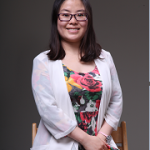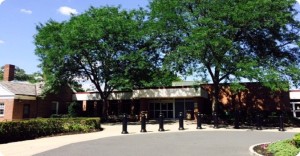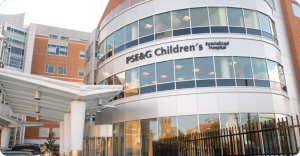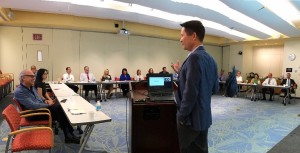
Dr. Amy Meng, Pediatrician, LIH Olivia’s Place Beijing
Children’s Specialized Hospital in New Jersey, US, was established in 1891. It celebrated its 125th year in 2016 and continue to provide leading healthcare services in children’s rehabilitation. As part of the partnership between CSH and LIH Healthcare, Dr. Amy Meng, Developmental Behavioral Pediatrician at LIH Olivia’s Place Beijing, travelled to CSH to completed an “externship.”
Meeting CSH in front of the Maple Leaf
It is said that the maple leaf in the eastern United States enjoys great reputation. The Children’s Specialized Hospital (CSH) Mountainside campus is located among long and narrow two-story buildings. The buildings are on a slightly raised hillside and hidden among maple trees, quiet and peaceful. Walking in to CSH Mountainside for the first time, I could see doctors, front desk, and waiting areas. Everything was in good order. Staff who were busy working greeted me with warm smiles.

CSH Mountainside Campus
The first night I arrived at CSH, I had the honor to attend their quarterly commendation meeting. They shared new rehabilitation therapy methods and presented case studies to explain how to use those methods effectively. This made me feel the strong academic atmosphere of CSH.
Profound Education with Dr. Beckwith
The following days were mostly spent in the out-patient department of CSH Mountainside. This department includes the Behavioral Development Unit, Physiatry Department, Psychology Department, and Medical Department.
My first station was the Behavioral Development Unit, where I spent about 6 weeks. This unit mainly sees children with developmental disorders, learning disorders, social communication disorders, cognitive impairment, and attention deficit hyperactivity disorder.
Developmental behavioral pediatrics is an emerging discipline with only several decades of history even in foreign countries. In China, we just establish this discipline in 2016. There are few behavioral development physicians in China. And the knowledge of most domestic developmental behavioral physicians is limited to common disorders such as autism, developmental delay, cognitive impairment, and hyperactivity. Actually, this specialty includes these conditions but also any diagnosis associateed with intelligence, development, and behavior belongs to behavioral development, such as Angelman syndrome, Williams syndrome and Down syndrome. In China, children with these diseases often visit a Children’s Neurology Unit, Children’s Healthcare, or Children’s Psychology Unit. Physicians in top-level hospitals may have contact with and know about behavioral development, however, the vast majority of physicians in China are not familiar with behavioral development, let alone the best intervention methods, intervention effects, referral opportunities, and referral organizations. For parents of children with special needs, it is hard. They often feel conflicted, confused, and helpless. In the first-tier cities like Beijing, parents can visit some pediatric rehabilitation or behavioral development hospitals. However, compared with CSH, both physicians and therapists in China have great space for improvement.
Most of the time at CSH Mountainside, I followed Dr. Beckwith in an internship program. Dr. Beckwith is a promising young physician who is the Director of Behavioral Development. He has been rated as one the most popular physicians among parents. Ninety percent of patients here are children with autism and ADHD, but there there are also some rare conditions like Prader-Willi syndrome.
Patient-centered CSH
Physicians in China usually have time pressure because there are so many patients; however, It seems that CSH gives abundant time and space for physicians to communicate with children and families. Generally speaking, for a first-visit patient, physician would spend 60 to 90 minutes in the first consultation. Actually, in that “short 90 minutes” consultation, physicians need lots of information, such as ADHD symptoms, complications, learning ability testing, medication, and communication methods. They spend half of the time listening to parents’ concerns. Dr. Beckwith once said that abundant outpatient time is the important guarantee of patient satisfaction. Meanwhile, physicians show great respect to patients’ privacy. Before each of my observations, we requested permission from parents. Over the years, CSH has obtained consistent praise in a nationwide patient satisfaction evaluation (Press Ganey). This rare achievement is based on the 125 years of culture and history of this hospital.
What is a Developmental Behavioral Physician?
Physicians who receive American Developmental Behavioral Physician Training (i.e., fellow) must have an American pediatrician background, receive three years of training, and pass a national board examination every year. CSH arranges learning schedules for fellows, for example, following home visits, attending classes and discussion meetings, medical records discussions, etc. As a fellow, they are required to have a good command of common diseases and medications, know the behavioral development characteristics of rare conditions and understand relevant specialties. For example, CSH fellows are required to receive training in the Physiatry Department for three and half months, learn relevant psychology knowledge, and also to participate in research programs.
I benefitted a lot from my experience in the CSH Physiatry Department. The main responsibilities of this department are addressing problems of various kinds of movement disorders, testing movement performance, adjusting appliances, and relieving muscle tension (Botox or surgery). It is beneficial for developmental behavioral physicians to experience all kinds of complex disorders over time. In an interdisciplinary setting, physicians need to be familiar with various complex conditions and symptoms in order to judge when to refer to physical therapy and what kinds of therapy skills should be referred.
In China, it is commonly accepted that the precondition to be a qualified developmental behavioral pediatrician is he/she has to be a pediatrician with general clinical experience. Besides knowing about children’s development and treatment for common developmental conditions, he/she also needs to master knowledge of genetic disorders, nervous system diseases, auditory problems, and movement disorders and other relevant problems, to have certain understanding on psychology, applied behavioral analysis, linguistics, occupational and physical therapy, and how to use common tools of behavioral development.
Summary
I am much honored to have this internship in behavioral development as a representative of LIH Healthcare. I was deeply moved by CSH and their physicians, by their high efficiency and patient-centered service model, professional ethics, modest attitudes, powerful knowledge base, and treatment outcomes. They are not only modest and knowledgeable, but also very warm-hearted. When they knew my eagerness to help children in China, they were very generous to explain knowledge and refer relevant books to me. I understand that I still have a long way to go to be a qualified developmental behavioral pediatrician. With their encouragement and support and hard work on my part, I hope in the near future I can contribute my own efforts in treating children in China.








